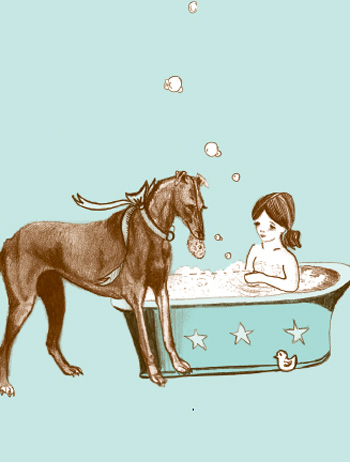

“People who say they sleep like babies usually don’t have them.”
—Leo J. Burke
In this chapter you’ll find the most popular ways to get baby to sleep, passed on from parent to parent over the years. Although not all babies are the same, the tips in this chapter seem to work for most. They’re standards for a reason—they’ve helped generations of parents and, in turn, will most likely work for you. As I mentioned, some of these ideas may be new to you, while others will seem like common knowledge—but it’s always good to be reminded and to try the techniques again. They’re especially handy if you’re just beginning to play the sleep game with your first child.
Change your baby into the same pajamas as a cue that it’s time for sleep. Then, each time you put on Baby’s pajamas, he will know what to expect. (Don’t forget to wash them often!)

Give your baby a warm, soothing bath to relax her and she’ll be more apt to nod off afterward.

Put lotion on your hands to warm it up, then give your baby a gentle massage to help relax his muscles.

Sing a lullaby or hum a simple tune to lull and comfort your baby to sleep. (For my favorite lullabies, see “Sweet Sounds,” page 129.)

Turn on classical music or a quiet song for Baby to listen to while she goes to sleep.

Tell a story, read the newspaper, or just chat about your day with your baby in a low, rhythmic voice to help mesmerize him into dreamland.

Repeat your favorite prayers to hypnotize your baby to snoozeville.

Use the book Goodnight Moon as a model for getting your baby to sleep. Say good night to everything in baby’s room—a “lovey” (stuffed animal), a picture, a mobile, and so on. (See “Bedtime Books,” page 126.)

Swing your baby in your arms vigorously—the rocking motion causes drowsiness.

Wear your baby in a front pack or sling as you move around the house or take a walk. The motion will lead your baby to drift off.

Give your baby the same blanket each time you put her down, so she associates it with night-night time.

Buy a teddy bear that comes with the sound of a heartbeat, and leave it in the crib with your baby. It simulates the sounds your baby heard in the womb, which is comforting to her. You can also buy CDs with music that sounds like Mother. (See “Resources,” page 138.)

Many babies fall asleep while nursing. If this happens, carry your baby carefully to the crib and set him down gently so you don’t wake him. But don’t leave a bottle in the crib, or the liquid that remains in your baby’s mouth may lead to cavities.

Invest in a comfortable rocking chair and rock your baby to sleep in it.

Hang a mobile over your baby’s crib, wind it up, and let him watch and listen as he dozes off.

If you have a room fan, switch it on. The sound of the fan and the movement of the air cause many babies to go to sleep.

Blow gently on your baby’s face. It helps her close her eyes and drift off. (Avoid eating onions and garlic, though!)

Play CDs or DVDs that have the gentle sounds of rain, the ocean, the forest, birds, and so on. They help relax baby and drown out other noises.

Put your baby in his crib, then gently pat or stroke his arms, legs, forehead, and belly.

Keep the lights dim in baby’s room at nighttime, and use blackout curtains during baby’s daytime naps.

If your baby is teething, apply a little teething ointment to his gums and rub them gently.

Give your baby a gentle verbal reminder that it’s almost bed or nap time, such as “Night-night time!” or “Time for beddy-bye!” so she can adjust to the idea before you put her down.

If your baby or toddler is beginning to skip his second nap, try alternating one nap one day, two naps the next. That way your baby will still be tired enough to go to sleep at night. Or, just let him skip the second nap all the time if he doesn’t seem to need it.

Put your baby in the car seat and drive around until she falls asleep. This works with most babies almost every time.
